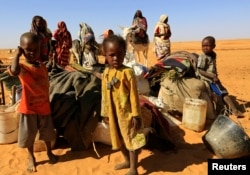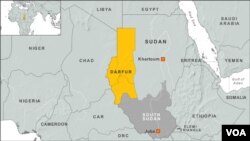Sudan's justice minister has refuted claims by displaced persons in the Jebel Marra area of Darfur that they suffered chemical exposure at the hands of the government of Sudan.
Amnesty International reported earlier Thursday that since January, people in Jebel Marra have reported blisters and rashes, peeling skin, eye problems including total vision loss, bloody vomit, diarrhea and severe respiratory problems.
Amnesty said the symptoms are due to chemical weapons used by Sudanese authorities. As many as 250 people, including children, may have died as a result of chemical attacks, and hundreds more have been injured, according to the rights group.
But Minister of Justice Awad Hassan Elnour responded in a letter Thursday that government officials were "very astonished" to hear the allegations. He said it was the first he had heard of such events, which he said imply "a heinous humanitarian crime."
WATCH: WARNING Graphic images Amnesty International video
Elnour noted in his letter that members of a government fact-finding mission traveled to Darfur in February and met for three hours with people displaced by military operations in Jebel Marra. He said the people, who came from central Darfur villages such as Golo, Rokro and Nertiti, reported that they had left their villages to avoid the military violence and none had reported symptoms like those described by Amnesty.
Elnour also said Sudanese troops are in the area to defend against attacks by rebels. He said the armed forces are carrying out their constitutional duty in protecting the citizens and preserving the integrity, security and stability of the country and the people. He said they have had extensive training in humanitarian law.
Amnesty said the reports are new for the area.
"This is the first time, as far as we are aware of, as survivors and monitors on the ground, this is the first time that we've documented the use of chemical weapons, so it is sort of a radical departure," said Muthoni Wanyeki, Amnesty International's regional director for East Africa, the Horn and the Great Lakes.
Civilians deliberately targeted
The report released by Amnesty on Thursday states that Sudanese security forces have deliberately targeted civilians and their property, including the probable use of "blister agents" — a banned class of chemical weapons — in roughly 32 villages in the Jebel Marra area.
Reuters news agency quotes Sudan's U.N. ambassador as saying the Amnesty report was "utterly unfounded" and that Sudan does not possess any type of chemical weapons.
Magnus Taylor is the International Crisis Group’s Horn of Africa analyst for Sudan and Uganda.
“We already knew, prior to the release of the Amnesty report, that the Sudanese government's counter-insurgency in Jebel Marra was bad,” Taylor said. “But if these allegations of chemical weapon use are true, then we may be just starting to learn how bad. It's difficult to fully understand what Khartoum's motives for committing such atrocities would be, in a war they were already winning, at a time when the government is making overtures to the international community."
Later Thursday, U.S. State Department spokesman John Kirby said the agency had only recently received Amnesty's report, "But the allegation of scorched-earth tactics presented in the report, including the unlawful killing of civilians, the abduction and rape of women, the forced displacement, the looting, the use of chemical weapons -- all of that are deeply concerning."
Kirby said the U.S. "unequivocally" condemns the use of chemical weapons any time. "Sudan is a state party to the Chemical Weapons Convention," he said, "and the use of chemicals as weapons by the government would violate its obligations under that convention."
Hundreds of phone interviews
Amnesty International said it conducted 235 phone interviews for the report, because the Sudanese government did not allow them field access. The group said local intermediaries helped to identify and contact survivors.
Amnesty International has asked the U.N. Security Council and state parties to the convention on chemical weapons to conduct follow-up investigations in Darfur. It is calling on Sudan's government to stop the attacks, and also to give international aid agencies access to Jebel Marra.
"I think it's really important that this get back on the map," Wanyeki said. "I think that we have dropped attention as Africa, as the rest of the world, on Sudan, on Darfur, and the other conflict areas in the Sudan. And I think given ... this type of re-engagement, [that] can't happen until this sort of thing stops."
Over 300,000 deaths
The U.N. estimates that more than 300,000 people have died in Darfur since 2003, when rebels there launched a rebellion, citing discrimination and marginalization. The government responded by unleashing militias known as Janjaweed to cause chaos in the region. Fighting has never entirely stopped in the 13 years since.
Sudanese President Omar al-Bashir is wanted by the International Criminal Court on charges of war crimes, crimes against humanity and genocide in Darfur, but has denied the allegations and avoided arrest.









